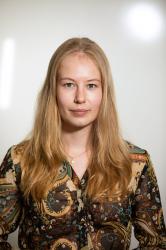Listening to Sunna Friðjóns’ new album, ‘Let the Light In’, is to be transported to another world. The mystically flowing songs evoke scenes that are easy to retreat into when you feel the need to escape this pandemic-infused reality for a moment. It’s no wonder that this year’s You Should Have Heard This award goes to Sunna.
It’s rare to come across music that paints such vivid pictures in your mind. When music is composed for movies, the films are usually created first and the music is added afterwards. Sunna’s albums do just the opposite: it’s like you’re constructing a film in your mind around the music you’re hearing.
Classical background
“People tend to say that my music feels like it should be a part of a movie,” Sunna laughs, adding that it’s actually a dream of hers to compose a soundtrack for a film that she connects to. Sunna’s music could be categorised as Chamber Pop, as she is using instruments typical to chamber music to form modern melodies. Her background in classical music pushes through in her compositions, but she’s freed herself of the strict rules of the genre.
“I feel like I never belonged in that box. However much I loved the music and playing in youth orchestras, I didn’t fully fit in it. I needed to find something that would suit me better,” Sunna explains.
Perceiving the world
Sunna’s music is based on how she perceives the world and energies around her. “I try to translate my feelings into music. Even when I’m not certain how I actually feel about something, the outcome makes sense when it’s put into a musical form,” she describes. This translation process results in cinematic pieces where every little detail matters, with each adding a little something to the aural world being created. Filled with particular sounds and moments, the songs truly are more than the sum of their parts.
“I’m very sensitive to sounds and want to add texture to my music through them,” Sunna says. Sounds are not the only thing Sunna is sensitive to. She’s very aware of the energies around her, which has led her to become a healer as well. She has experimented with combining the two fields together, and in the future, we will see more of her signature group healing concerts. “I won’t stop making music as is, but I do want to organise more of these healing events,” she promises.
We’re happy to hear that Sunna will continue to make more masterpieces. After all, she seems to have managed to transfer her healing abilities to her music, too—whether it was intentional or not.
PANEL: Alexander Jean de Fontenay – Music expert, DJ and art student
Arnar Eggert Thoroddsen – Journalist and PhD in Socio-musicology
Hannah Jane Cohen – Former cultural editor at Reykjavík Grapevine and performing artist
Nína Richter – Cultural journalist at Fréttablaðið and a musician
Valur Grettisson – Editor-in-chief at The Reykjavík Grapevine
Buy subscriptions, t-shirts and more from our shop right here!
















